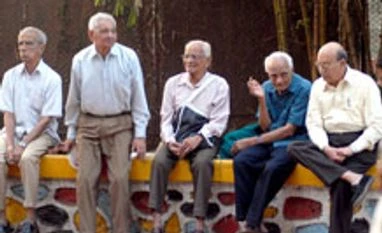It isn't easy being a retired person. With some banks already cutting down the rate of return on fixed deposits offered to senior citizens and the Union Budget rationalising dividend taxation on monthly income plans, the higher returns and tax benefits they enjoyed are already gone.
But the Reserve Bank of India (RBI) capping the penalty on delays in pension payment will hurt them further. Earlier, they would get the Bank Rate plus two per cent - a good 10.5 per cent annually. The apex bank has now capped it to eight per cent annually.
At present, the process works in this manner. Once the government - central, state or a public sector undertaking - issues the pension payment order, the bank is supposed to pay the pension within the next two to three days. Banks make the payments from their own resources, from their nominal accounts and subsequently claim the money from the RBI.
Bank officials, however, say delays have come down substantially in recent years. "Today, an exceptional delay would be at the most five-six days. It is very rare that pension payments are delayed for a month or longer. The penalty is more of a deterrent to prevent any delay. The final amount that the bank may have to pay will not be much and banks won't mind paying it, if needed," said a bank official.
But for pensioners, even a delay of five-six days can be tough, especially if there are equated monthly instalments or other expenses like rent to be incurred at the beginning of the month. In such cases, banks offer an overdraft facility on the pension accounts for a cost, usually Base Rate plus one per cent.
Of course, if the Bank Rate moves down, senior citizens may benefit, as they will continue to get eight per cent. However, this rate is also subject to review as considered appropriate by the RBI. The Bank Rate had touched six per cent in December 2011.
There are practical reasons for the delays. Sometimes it might occur if the pensioner does not submit the life certificate to the bank. All pension account holders are supposed to submit the life certificate, or proof that he or she is alive, every year in the month of November. If the pensioner is not able to submit the life certificate due to an illness, then an official from the bank branch visits the pensioner's home to verify.
V N Kulkarni, of debt counselling centre Abhay, and a former bank official, doubts whether these guidelines will be implemented well. "First, the concerned official must admit that there has been a delay and they pay the penalty. That will mean having to answer his seniors. So, the bank may not admit to the delay," he says.
However, given that India has nothing in terms of social security for pensioners, delays should be penalised more aggressively.
But the Reserve Bank of India (RBI) capping the penalty on delays in pension payment will hurt them further. Earlier, they would get the Bank Rate plus two per cent - a good 10.5 per cent annually. The apex bank has now capped it to eight per cent annually.
At present, the process works in this manner. Once the government - central, state or a public sector undertaking - issues the pension payment order, the bank is supposed to pay the pension within the next two to three days. Banks make the payments from their own resources, from their nominal accounts and subsequently claim the money from the RBI.
More From This Section
The RBI guidelines on this are quite stringent. "A pensioner is entitled for compensation for delayed credit of pension/arrears... and the same should be credited to the pensioner's account automatically by the bank on the same day when the bank affords delayed credit of such pension/arrears, etc, without any claim from the pensioner," says the circular.
Bank officials, however, say delays have come down substantially in recent years. "Today, an exceptional delay would be at the most five-six days. It is very rare that pension payments are delayed for a month or longer. The penalty is more of a deterrent to prevent any delay. The final amount that the bank may have to pay will not be much and banks won't mind paying it, if needed," said a bank official.
But for pensioners, even a delay of five-six days can be tough, especially if there are equated monthly instalments or other expenses like rent to be incurred at the beginning of the month. In such cases, banks offer an overdraft facility on the pension accounts for a cost, usually Base Rate plus one per cent.
Of course, if the Bank Rate moves down, senior citizens may benefit, as they will continue to get eight per cent. However, this rate is also subject to review as considered appropriate by the RBI. The Bank Rate had touched six per cent in December 2011.
There are practical reasons for the delays. Sometimes it might occur if the pensioner does not submit the life certificate to the bank. All pension account holders are supposed to submit the life certificate, or proof that he or she is alive, every year in the month of November. If the pensioner is not able to submit the life certificate due to an illness, then an official from the bank branch visits the pensioner's home to verify.
V N Kulkarni, of debt counselling centre Abhay, and a former bank official, doubts whether these guidelines will be implemented well. "First, the concerned official must admit that there has been a delay and they pay the penalty. That will mean having to answer his seniors. So, the bank may not admit to the delay," he says.
However, given that India has nothing in terms of social security for pensioners, delays should be penalised more aggressively.
)